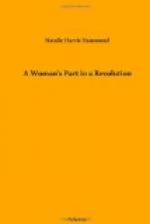An influential deputation from the Cape Town branch of the Africander Bond wait upon President Kruger, and a petition signed by sixty members of the Cape Parliament is read to him. Another deputation comes from the Chamber of Commerce. The Mayor of Durban forwards through the Colonial Secretary a petition bearing 1,250 names, and the Kimberley branch of the Bond send a petition. Nothing comes of it all. The President appoints the 7th to be a day of humiliation and prayer, and Dr. Leyds doubles his bodyguard.
JUNE 10.—The whole of South Africa is appealing to President Kruger to let the leaders free. The entire white population—two millions of people—give voice to this desire and hope of United South Africa. One hundred and fifty mayors, representing 200 towns and many of the rural districts, are in Pretoria waiting for audience with the Executive Council.
This evening, Thursday, June 11, the leaders were given their liberty after paying each a fine of 125,000 dollars, and taking an oath to abstain from taking part in the politics of the Transvaal. Colonel Rhodes refused, being an English officer, to take the oath, and was banished, not to appear again in the Transvaal, under pain of death.
The Executive then politely announced its decision to receive the Mayoral delegates on Saturday morning next. Perhaps the Mayors were not mad! Some of these men had trekked for days in ox-wagons before reaching the railroad to take train for Pretoria. A large banquet was given in their honour. They insisted upon the liberated leaders being invited as guests—but those criminals, leaders, and instigators did not attend, deeming it injudicious under the circumstances.
My husband flew to me, who am still kept indoors. He came with a light in his face I had not seen for months. ‘We are free!’
JUNE 12.—This is a gala day in Johannesburg. Everybody is joyous—Kruger’s name is cheered everywhere. Several thousand people were at the station to receive the leaders. Messrs. Phillips and Farrar were the only two left of the four to step off the train. They were caught up shoulder-high and carried by the crowd. Cheers rent the air. The horses were unyoked from their victoria, and willing hands grasped the shafts; and like returning conquerors, instead of criminals, these instigators were dragged triumphantly down the heart of the town followed by a vociferous multitude.
As the invited guests of Cape Colony we travelled on a special train to Cape Town—by ‘we,’ I mean a dozen or two Reformers with their families. The heartfelt ringing cheers as we pulled out of the station I can never forget. The cheers again at Bloemfontein and the strangers who came forward to shake hands and congratulate have enriched my life. One man at a way station in the Free State rode up shouting:
‘Where is the American, John Hays Hammond?’ My husband came forward. ’Mr. Hammond, I have come miles from an ostrich farm to shake hands with you. You are a white man, and Americans are proud of you!’




